
Chances are you know someone with a food allergy or diet restriction of some kind. We may worry about what to make, where to go, how to act and what is the social decorum for our friends with food allergies? The main concepts to remember are to ask, listen and respect. People are at different places with their food allergies. When a person is brand new at eating in a completely different way, it can be emotional and difficult for him or her. If he or she says no to a particular food, please don’t pressure them. If he or she tells you what he or she can eat and cannot eat, believe them. If you don’t know, please ask. In the spirit of supporting our adult friends and family with food allergies, we share these guidelines written by “Rangergirl '' who has had Celiac Disease for 15 years. (Children may require more accommodations. Always check with the primary caregiver about a child’s food allergies.)
· We like going to restaurants that specifically cater toward our diets. Please, don’t make me eat another salad! Yes, I want to hang out with my friends! Yes, I enjoy your company! No, I don’t want to look at an allergy-friendly menu that is secretly just a salad menu. I’m not on a diet to lose weight. I am on a diet so I can get out of bed in the morning and live my life.
· We have to read ingredient lists on all the things. Chips? Baking mix? Lotion? Medicine? We need to read the ingredients. We read the ingredients on everything. We have read the words “maltodextrin” and “soy lecithin” and even “hydroxypropyltrimonium chloride” more times than you can possibly imagine. Allergens show up in the weirdest places! We have to double check to make sure we don’t get sick.
· Traveling is a nightmare. Traveling can be a lot for anyone to handle, but it is especially hard for people with food allergies. It is very expensive to plan on eating out for an entire trip, and difficult to buy food in many places across the country. Trip planning for people with food allergies usually involves checking the area for health food stores as well as trying to find a place to stay with a kitchen. It gets expensive very quickly.
· Please do not cook for us. It is so thoughtful that you want to make something for your friend with celiac or a food allergy. We are not declining the offer because we are worried about putting you out. It is almost always a health hazard to eat food prepared in someone else's kitchen. Did that cutting board have a bread crumb on it? Did that baking sheet have any residue from baked goods? Did you use a measuring spoon for flour and then use it on baking powder? It is almost impossible to avoid cross contamination. If you really want to feed your friend with a food allergy or Celiac Disease, consider buying something pre-packaged or ask for a suggestion.
· You are not expected to plan around me. It is okay. It is okay if you didn’t make anything for your friend who is coming over who has food allergies. We are used to bringing our own food wherever we go. It is okay if you accidentally offer us something we can’t have. (Except for young children. Be sure to check with primary caregivers about the specifics of a child with food allergies.) No matter how delicious, we do not wish to eat something that will make us ill. Health is too important. You are a good friend and we are happy to be spending time with you.
There is still stigma about those who choose to eat healthy foods. Sometimes a person may not have a food allergy and is simply trying to eat right. With heart disease and diabetes still in the top ten leading causes of death, please be kind and let people try to change. Listen to, ask preferences of and respect the replies of those who are eating for their health due to allergies or other medical conditions. We are all in this together.
If you need a new appointment with your primary care provider or with a gastroenterologist to follow up on any food allergy concerns, please call Lovelace Care Concierge at 505.727.7677.
References
https://www.cdc.gov/nchs/fastats/leading-causes-of-death.htm




